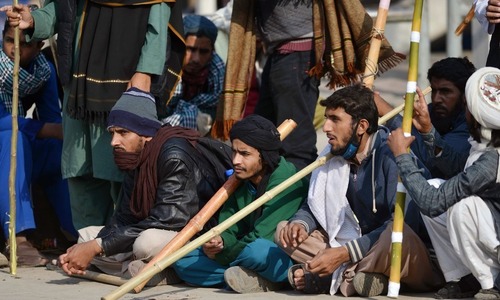Senate Chairman Raza Rabbani on Monday admonished Minister of State for Interior Affairs Talal Chaudhry and asked that "the house wants to know what forced the government to sign an agreement with the protesters" who had staged a sit-in at Faizabad.
After the weeks-long protest that virtually paralysed the capital, the government and protesters reached an agreement late Sunday night, in which the former conceded to the latter's demands.
Rabbani asked why Interior Minister Ahsan Iqbal was not present in the Senate to explain the government's position on the agreement with the Faizabad sit-in protesters.
To this Chaudhry replied that Ahsan Iqbal was travelling and, therefore, could not be contacted.
Rabbani also expressed disappointment on Prime Minister Shahid Khaqan Abbasi's visit to Saudi Arabia. "The prime minister leaves for abroad on the very same day [the agreement is finalised]. Is the Riyadh summit more important than what has happened in the country?"
"The [real] issue is that your law minister was forced to resign," Rabbani maintained.
The Senate chairman said the parliament was not taken into confidence [before the agreement] because "it appears that the government did not find it important enough" to consult the parliament.
"You are taking the parliament, which can become your strength, for granted," Rabbani said, adding that "this House wants to know why there was a need to call the army?"
Earlier, the Islamabad High Court (IHC) had lashed out at the government as well as the army for the role assigned to the military "as the mediator" in the agreement to end the sit-in at Faizabad Interchange.
The army chief instead of following the orders of the chief executive became a mediator, pointed out Justice Shaukat Aziz Siddiqui as a hearing into the Faizabad protest was underway at the high court.
"Who is the Army to adopt a mediator's role?" inquired the judge. "Where does the law assign this role to a major general?"
Moreover, PPP Senator Farhatullah Babar demanded a judicial inquiry into all previous sit-ins including the recent one by TLY Pakistan, suspecting the protesters had "ulterior motives".
"This is for the first time that a minister has had to resign because of a sit-in," Senator Babar said, expressing concern over DG ISPR's statement following the telephonic conversation between Chief of Army Staff Gen Qamar Javed Bajwa and the prime minister — in which Bajwa had urged both sides to avoid violence.
"Was it necessary to issue a press release following the telephonic contact?" he questioned.
"The term 'both sides' equates the protesters — already declared as terrorists by the IHC — with a legitimate government that is constitutionally bound to protect the life, property, and honour of citizens."
"The interior minister mishandled the situation, no doubt, but his error of judgement is no reason to equate the two sides," Babar said.













































